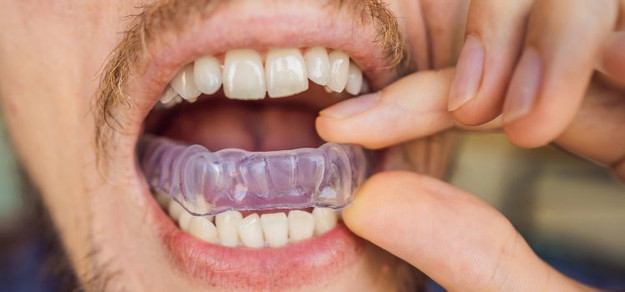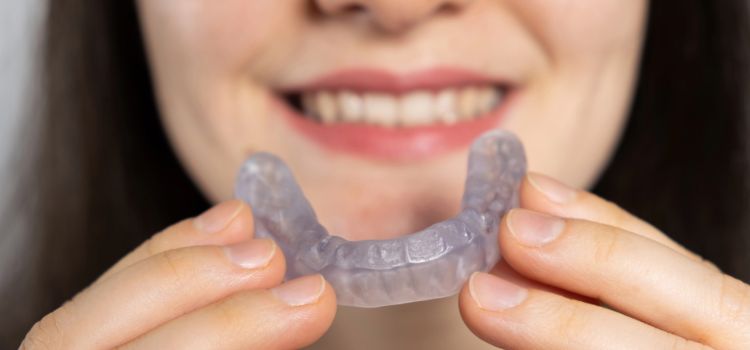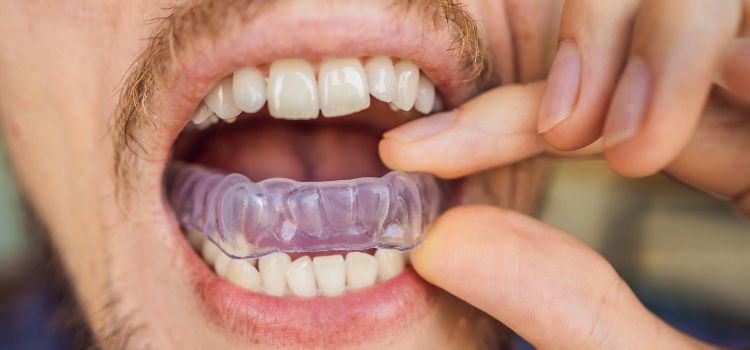Night Guard Before and After
11th Jul 2025

If you’re grinding your teeth at night or waking up with jaw pain, you might be thinking—will a night guard really help? The short answer is: yes, it can make a big difference.
In this post, we’ll show you what to expect before and after using a night guard. From pain relief to protecting your teeth, you’ll get a clear picture of how it works and why it’s worth it.
Before and After: What Changes Can You Expect?

Before using a night guard, many people experience sore jaws, morning headaches, sensitive teeth, or even chipped and worn-down teeth. These are common signs of grinding or clenching—usually while asleep and without knowing it.
But after using a night guard regularly, most people feel real relief. The pain eases, headaches become less frequent, and teeth feel less sensitive. Over time, a custom-fit night guard helps protect your teeth from further damage and keeps your smile healthy.
Research shows dental guards do more than protect teeth—they reduce muscle tension, ease TMJ pain, and improve sleep by spreading pressure and preventing enamel wear.
Did you know? A review of studies found that stress is closely linked to teeth grinding, especially in adults. While some research included children, stressed adults were more likely to grind or clench their teeth.

- Most Popular
- Hard Outside, Soft Inside
- 2MM Thick
- Moderate / Heavy

- Most Durable
- Hard Materials
- 1.5MM Thick
- Heavy / Severe

- For Day Time Use
- Thin, Barely Visible
- 1MM Thick
- Light / Moderate

- For Clenching
- Flexible & Soft
- 1.5MM Thick
- Light / Moderate
Real Results: Visible and Physical Improvements
One of the biggest benefits of wearing a night guard is that you can actually feel—and sometimes see—the difference. Many people report:
- Fewer chips or cracks in their teeth
- A more even bite or less pressure on certain teeth
- Less gum recession caused by grinding
- Reduced muscle tension in the jaw or face
Physically, you might also notice better sleep and less tightness in your jaw when you wake up.
One study found it also reduced dry mouth, thirst, and tongue discomfort at night—showing it helps more than just your teeth.
According to Colgate, grinding can cause chipped teeth, jaw pain, and morning headaches—often due to stress or medications. A night guard cushions your teeth and reduces pressure on your jaw, helping your mouth feel better each day.
Note: Over time, using a night guard can help you avoid expensive dental work like crowns, veneers, or even tooth loss due to ongoing grinding.
Related Articles:
- Wearing a Night Guard: Pros and Cons
- Benefits Of A Night Guard
- How Long Does it Take for a Night Guard to Work?
Are There Side Effects from Wearing a Night Guard?

Most people adjust to a night guard fairly quickly, but like anything new, it can take a few nights to get used to. Here are some things you might notice early on:
Mild discomfort or pressure
It’s normal to feel slight discomfort during the first few nights. Your teeth and jaw are simply adjusting to the new guard.
More saliva than usual
Some people notice they produce extra saliva at first. This is your mouth reacting to something new, and it usually settles down quickly.
Changes in how your bite feels
If the night guard doesn’t fit properly, it might make your bite feel slightly off. This is more common with over-the-counter guards.
Trouble sleeping at first
Wearing a night guard can feel strange in the beginning, and that might make it harder to fall asleep for the first few nights.
Note: These side effects are usually temporary and go away within a week or two. If the night guard continues to feel uncomfortable or affects your bite long-term, it may not be the right fit.
Can a Night Guard Prevent or Reverse Damage?
A night guard can’t reverse damage that’s already been done—like enamel loss or flattened teeth—but it can stop things from getting worse.
Think of it like a shield. It cushions your teeth and absorbs the pressure from grinding or clenching, so your enamel stays protected. That means fewer chips, cracks, or worn-down spots over time.
Note: While it won’t rebuild what’s already lost, it helps you avoid more serious (and costly) dental problems down the line—like root canals, crowns, or even tooth loss.
Related Articles:
Is It Worth It? Cost vs. Benefit
Store-bought night guards seem cheaper—at first
They’re easy to find and cost less upfront, but they often don’t fit well, wear out quickly, and may not protect your teeth properly.
Custom-fit night guards cost more—but last longer
A custom-fit guard is made just for your teeth. It offers better comfort, better protection, and can last for years with proper care.
Better protection means fewer dental bills
A night guard can help you avoid cracked teeth, jaw pain, and expensive dental treatments in the future.
It’s an investment in your smile—and your sleep
If it helps you wake up without pain, sleep better, and keep your teeth safe, a night guard is well worth it.
Note: A 2018 article from the British Dental Journal explains that night guards protect teeth from grinding but stresses the need for a custom fit, proper design, and follow-up to prevent bite changes.
FAQs: Answering Common Questions About Night Guards
1. How long does it take to notice improvements?
You might feel relief from jaw pain or headaches within a few days of using a night guard. Long-term benefits—like protecting enamel and preventing further damage—usually become noticeable after a few weeks or months. Read more on: How Long Does it Take for a Night Guard to Work?
2. Can a night guard stop teeth grinding completely?
While a night guard doesn’t stop grinding altogether, it acts as a protective barrier to prevent damage caused by grinding and clenching. It also helps reduce jaw tension, which can decrease grinding over time.
3. What if I have dental work like braces or crowns?
Custom night guards can be made to fit around dental work like braces, crowns, or implants. Consult your dentist or provider to ensure the guard is properly tailored to your needs. Read more on: Night Guard With Braces, Can You Wear A Night Guard with A Crown?
4. How often should I replace my night guard?
Most custom night guards last 3 to 5 years with proper care. However, if you notice cracks, wear, or discomfort, it’s time to replace it. Read more on: How Long Does A Night Guard Last?
Conclusion
Wearing a night guard might seem like a small step, but it can make a big difference. It helps ease jaw pain, reduce headaches, and protect your teeth from damage.
Not sure if it’s worth it? Think of what you’re protecting—your comfort, your smile, and your long-term dental health. A custom night guard gives you the best chance at real relief.
Pro Teeth Guard offers custom-fit night guards made in a professional dental lab, with a 110% money-back guarantee and a 1-year warranty. It’s a risk-free way to protect your smile.
References
- Seraj, B., Shahrabi, M., Ghadimi, S., & Golkari, A. (2020). Correlation between Parental-Reported Tooth Grinding and Sleep Disorders: Investigation in a Cohort of 741 Consecutive Children. Pain Research and Management, 2020, Article ID 3408928. https://doi.org/10.1155/2020/3408928
- Bereznicki, T., Barry, E., & Wilson, N. H. F. (2018). Unintended changes to the occlusion following the provision of night guards. British Dental Journal, 225, 715–722. https://doi.org/10.1038/sj.bdj.2018.869
- Yamamoto, K., Nagashima, H., Yamachika, S., Hoshiba, D., Yamaguchi, K., Yamada, H., Saito, I., & Nakagawa, Y. (2008). The application of a night guard for sleep‑related xerostomia. Oral Surgery, Oral Medicine, Oral Pathology, Oral Radiology, and Endodontology, 106(3), e11–e14. https://doi.org/10.1016/j.tripleo.2008.05.015
- Colgate. (2022, October 21). Mouth guard for teeth grinding: Five signs you need one. Colgate. Retrieved June 18, 2025, from https://www.colgate.com/en-ph/oral-health/bruxism/mouth-guard-for-teeth-grinding-five-signs-you-need-one-0214

- Most Popular
- Hard Outside, Soft Inside
- 2MM Thick
- Moderate / Heavy

- Most Durable
- Hard Materials
- 1.5MM Thick
- Heavy / Severe

- For Day Time Use
- Thin, Barely Visible
- 1MM Thick
- Light / Moderate

- For Clenching
- Flexible & Soft
- 1.5MM Thick
- Light / Moderate
